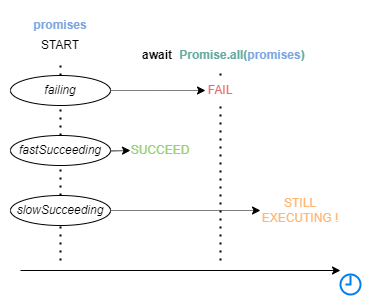This article aims to describe a tricky situation that can often occur when using Promise.all(),
and a simple solution to this problem.
The context
The MDN page for Promise.all() provides the following description of this function:
The
Promise.all()static method takes an iterable of promises as input and returns a single Promise. This returned promise fulfills when all of the input's promises fulfill (including when an empty iterable is passed), with an array of the fulfillment values. It rejects when any of the input's promises rejects, with this first rejection reason.
Promise.all() was introduced in the 6th edition of ECMAScript, published in 2015, when promises were first added as a builtin mechanism in the language, but they were already widely used before, through the use of libraries like bluebird.
ECMAScript 2020, the 11th edition, introduced Promise.allSettled(), which has a slightly different behaviour:
The
Promise.allSettled()static method takes an iterable of promises as input and returns a single Promise. This returned promise fulfills when all of the input's promises settle (including when an empty iterable is passed), with an array of objects that describe the outcome of each promise.
Finally, with the advent of async, Promise.all() & Promise.allSettled() can be used to await for the completion of several asynchronous functions:
await Promise.all([asyncFunc1(), asyncFunc2()]) // can throw an exception
const results = await Promise.allSettled([asyncFunc1(), asyncFunc2()]) // never throw an exception
The problem
Promise.all() is a very handy function, but its behaviour regarding error management is actually quite tricky.
Whereas Promise.allSettled() requires to check the promises resulting statuses,
the promise produced by Promise.all() will reject if any of the input promises fails.
And in that case, it means that await Promise.all(...) will throw an exception.
But when Promise.all() rejects, some of the input promises can still be executing!
And this situation is often not considered by developers.
The following diagram and code snippet demonstrates this problem:

async function sleep(durationMs) {
return new Promise((resolve) => setTimeout(resolve, durationMs));
}
async function sleepAndFail(durationMs) {
await sleep(durationMs);
throw new Error(`sleepAndFail(${durationMs}) FAILED`);
};
let promiseStatus = "not-started";
async function sleepAndTrackStatus(durationMs) {
promiseStatus = "executing";
await sleep(durationMs);
promiseStatus = `sleepAndTrackStatus(${durationMs}) SUCCEEDED`;
};
(async function () {
const failing = sleepAndFail(100);
const fastSucceeding = sleep(50);
const slowSucceeding = sleepAndTrackStatus(200);
try {
console.log(await Promise.all([
failing,
fastSucceeding,
slowSucceeding,
]));
} catch (error) {
console.log(error); // -> Error: sleepAndFail(100) FAILED
}
console.log("Final promiseStatus for slowSucceeding:", promiseStatus); // -> executing!
})()
The problem is that, when an input promise fails, Promise.all() will reject early, without waiting for the other promises, that can still be processing asynchronously.
This can lead to many problematic situations, where code executed by those other promises perform operations that can conflict with the code executed following the call to Promise.all(). For example, issues with database connexions or I/O with files can be expected.
In my case, I identified this underlying problem in a situation of cascading failures with a Jest test suite: the code in some asynchronous afterEach() methods wasn't properly waiting for shared resources to be cleaned up, when some unit tests were failing, due to a call to await Promise.all().
The root cause
Out of curiosity, I tried to find out the source code of the implementation of Promise.all().
I think most of its logic lies in the file src/builtins/promise-all.tq in the V8 JavaScript Engine.
.tq files are written in Torque, a high-level language specific to V8 that gets transpiled to C++. Hence, I found it difficult to figure out where the "short-circuit" promise rejection logic happens exactly in the implementation 😅.
For the curious reader, there is a section about the Torque language in the excellent learning-v8 repo by Daniel Bevenius.
A solution
Regarding this problem, Promise.allSettled() is a better alternative to Promise.all(),
as it waits for the completion of all the promises passed as parameter to this function.
In fact, allSettled was introduced to EcmaScript exactly for this reason, as its original proposal document reveals:
Promise.allSettledis unique in always waiting for all of its input values.
However, Promise.allSettled() requires that you handle potential rejections yourself, which can be easily forgotten, or create repeated boilerplate code.
The solution that I propose is a drop-in safe replacement for Promise.all():
/*
* This function ensures that (1) all the promises provided have completed
* and (2) that a rejection is produced if at least one of those promises is rejected.
*/
async function waitForPromises<T>(promises: Iterable<PromiseLike<T>>) {
const results = await Promise.allSettled(promises);
const rejectedResults: PromiseRejectedResult[] = results.filter(
(result): result is PromiseRejectedResult => result.status === "rejected"
);
if (rejectedResults.length === 1) {
throw rejectedResults[0].reason;
}
if (rejectedResults.length > 1) {
throw new AggregateError(rejectedResults.map((result) => result.reason), `${rejectedResults.length} promises failed`);
}
const successfulResults: PromiseFulfilledResult<Awaited<T>>[] = results.filter(
(result): result is PromiseFulfilledResult<Awaited<T>> => result.status === "fulfilled"
);
return successfulResults.map((result) => result.value);
}
This is in fact TypeScript with Generics, but you can just remove the : types and <T> to get valid Javascript code:
waitForPromises in Javascript
async function waitForPromises(promises) {
const results = await Promise.allSettled(promises);
const rejectedResults = results.filter(result => result.status === "rejected");
if (rejectedResults.length === 1) {
throw rejectedResults[0].reason;
}
if (rejectedResults.length > 1) {
throw new AggregateError(rejectedResults.map((result) => result.reason), `${rejectedResults.length} promises failed`);
}
return results.map((result) => result.value);
}You can test this function by replacing Promise.all by waitForPromises in the initial code snippet of this article.
Although sometimes the "short-circuit" behaviour of Promise.all can be handy, I think that waitForPromises is a better, safer alternative in most situations, and should be the go-to default option to await the completion ofseveral asynchronous functions.
(thanks to Reddit user @senocular for the very relevant feedbacks on this blog post)
Further readings
- GIF Cheatsheets for Javascript Promise API methods @ dev.to
- Avoid the Promise.all pitfall! Rate limit async function calls by Mike Talbot @ dev.to and also, on the same subject, Beware of Promise.all @ dev.to
- Beware of short-circuiting Promise combinators in JavaScript @ medium.com : an older article from 2019 already raising a similar warning














